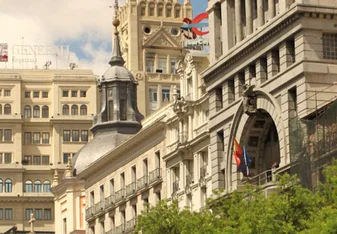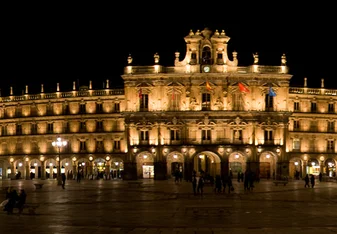Study Abroad Programs in Valencia
About
Have you ever wanted to study abroad in a coastal city where old meets new? If so, then Valencia is an ideal place for you! Positioned along the Mediterranean coast, Valencia is a youthful city of both modern and historical influences, making it a popular study abroad location. It is Spain’s third largest city with a population of 800,000 and the capital of the autonomous region of the same name!
Valencia lies about 3 ½ hours from both Madrid and Barcelona and is only a boat ride away from the Balearic Islands. The mix of modern architecture from the recently built City of Arts and Sciences with the historical Cathedral of Valencia and 14th century gates of the city gives students a unique view on Spanish life.
Scholarships
Does studying abroad sound fabulous but expensive? While it is true, studying abroad can mean added costs, there are still a variety of ways to offset the extra expenses. If you're not up for opening a lemonade stand, I suggest checking out the following scholarships.
- ISA offers a variety of scholarships applicable to their Valencia program.
- CC-CS scholarship fund offers multiple scholarships, celebrating diversity or rewarding academic excellence for alumni and program participants.
- More Study Abroad Grants and Scholarships
Planning Your Trip
Culture and Immersion
Valencia is home to two of Spain’s five official languages: Castellano and Valenciano. Don’t worry if you aren’t familiar with Valenciano because Castellano is spoken prominently throughout the city.
The mayor’s plaza is at the heart of the city with many popular places within walking distance including the Cathedral of Valencia, the Bull Ring, and the soccer stadium. The area around the University of Valencia is the place for student nightlife. This neighborhood is very cheap and packed with bars, dance clubs, and cool cafés.
One of the most recognizable locations in Valencia is the City of Arts and Sciences. Located less than two miles from the city Centre, you will find a strip of buildings dedicated to the arts and sciences that appear to be from the future. Located within the complex is an Opera house and Musical performance center, IMAX and planetarium, the Prince Felipe Museum of Science, and L’Oceanografic, the largest aquarium in Europe. There are parts of the City that are free to walk through and there are discounted student prices every day for admission to each attraction.
Valencia is also famous for its’ Las Fallas celebration held every spring. Huge figures, or ninots, are constructed in the streets throughout the city and region of Valencia. At the end of 2 ½ weeks, the city becomes an oversized bonfire with the burning of the ninots. It is unlike anything else held within Spain and an experience that students should not miss.
Affordability
Spain is part of the European Union so it uses the Euro as its’ currency. Because of this, it will be important to keep the exchange rate in mind when looking at finances. Both cash and cards can be used in Valencia. If you decide to use a debit card, be sure to notify your bank prior to leaving so they don’t freeze your accounts.
Even though Valencia is one of the largest cities in Spain, it isn’t very expensive to live in. It is also a city mostly accessible by foot so daily transportation fees are low. The average cost of a semester in Valencia is $12-15,000. It is important to research what each program offers with the amount of money it costs. Many times trips or additional tutoring are included in the program price.
Make sure to check out scholarships, too. There are scholarships out there for everything! Talk to your university to see what they offer. Also check out websites such as fastweb.com for many different scholarship opportunities.
Insider Tips
- Take advantage of the train station, located in the heart of the city. Trains are an inexpensive way to escape the city for a day, whether it is to a small town or another beach town.
- Get lost! The best way to learn more about a new city is to wander around for a day. You might be surprised how much getting lost helps you know your way around. Just in case, bring a map or write down a location that you know so if you can’t find your way back, you can ask a local to help you.
Quit always daydreaming about studying abroad. Find the right city and program for you and make it happen!
What People Are Saying
Related Study Abroad Articles
Frequently Asked Questions
-
Is it safe to live in Spain?
Spain is a very safe country. But, just like the rest of Europe, Spain is notorious for pickpockets. It's important to not carry your passport around and always keep an eye on your phone!
-
How long does it take to get a Spain student visa?
Processing your visa application takes the consulate about 4 weeks. The most lengthy part of the process is collecting all of the documents and securing an appointment. For some consulates it is very difficult to secure an appointment, so it is best to plan ahead.
The documents needed to apply for a student visa are:
- National visa application form + photocopy
- Original passport + photocopy
- One recent passport sized photo (to be attached to the form)
- Copy of the acceptance letter from the Spanish University (in Spanish or with Spanish translation)
- Evidence of funds (could be a statement from the University describing housing or a notarized letter from your parents assuming financial responsibility)
- Proof of health insurance
- Medical certificate (only need for stays longer than 180 days)
- Express mail envelope with pre-paid stamps addressed to yourself with which the consulate may return your passport with the visa
Related Content -
Can I work in Spain with a student visa?
On a student visa, you can work up to 20 hours in Spain with a work authorization requested by the company you'd like to work for. The company will have to request this authorization from the Oficina de Extranjería (Foreigner's Office). It can take from 3 weeks to 3 months to process your application depending on the province, so it's best to apply as early as possible!
Related Content



























